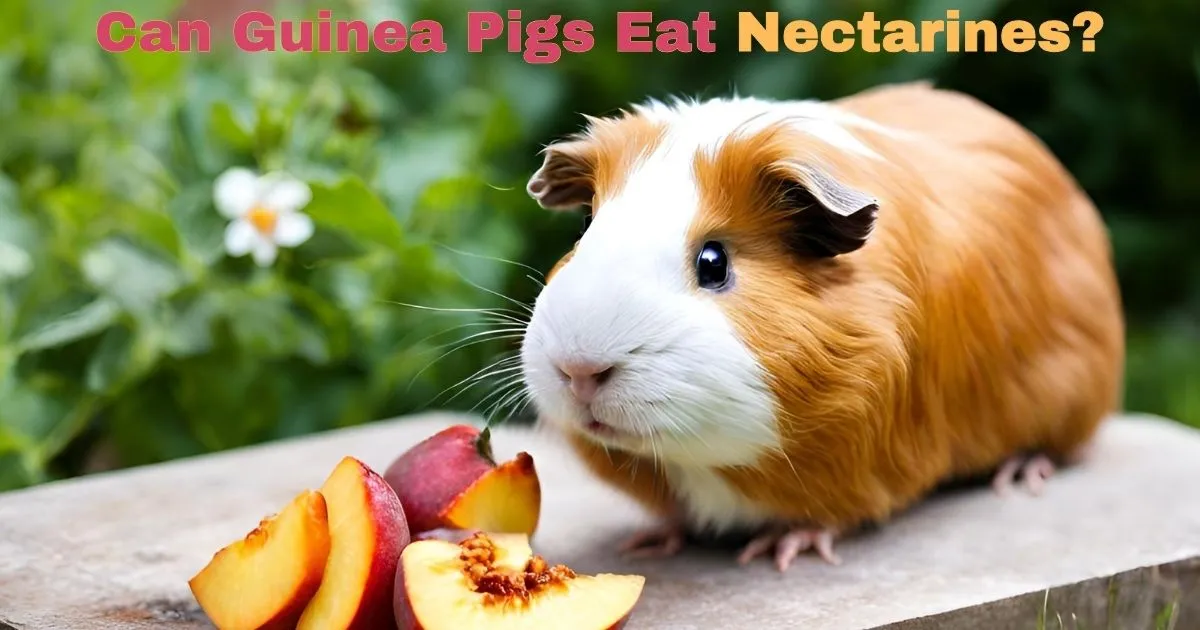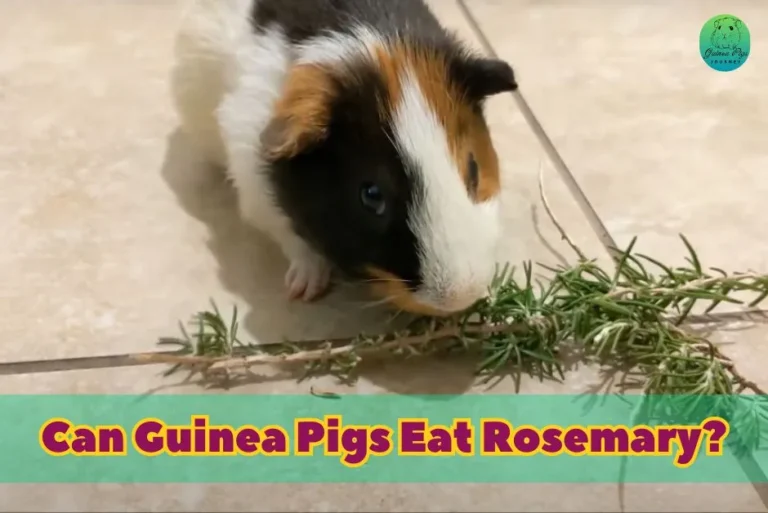Hey! Guinea Pig Owner, have you ever found yourself asking, Can guinea pigs eat Nectarine? Then you are at the right place to resolve this query. Here is the short answer!
Yes, obviously! Guinea pigs can eat nectarine (without stone) in moderation and gradual introduction to their diet as a lovely treat, but just like other fruits and veggies, nectarines do have some potential risk factors and benefits. Being a responsible owner, it is crucial to know about these factors, nutrition requirements, and some interesting facts before you feed this delicious fruit to your furry friends.
Do Guinea pigs like Nectarine, if they can eat it?
Yes, nectarine is a juicy, sweet, and crunchy fruit for guinea pigs, making a good treat for them if served in moderation and gradual introduction to limit the frequency of serving and achieving most of the benefits for guinea pigs.
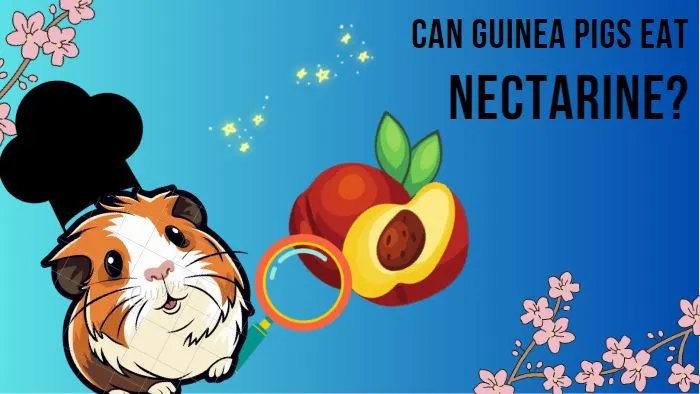
Let’s understand Nectarine for Guinea Pigs:
Guinea pig’s nutritional standpoint is Vitamin C; which is not self-produced just like humans, Guinea pigs require their owners to provide these nutrients. Nectarines are high in Vit C an essential element for the immune system, growth, and development of the guinea body, a good source of calcium important for healthy bones, phosphorus important for bone development, and many other nutrients that make a healthy lifestyle.
Nectarines offer the best result for guinea pigs when fed in moderation. Excessive feeding of nectarine to guinea pigs can lead to some negative complications which are not good for the well-being of guinea pigs.
Be aware of the stone in the middle, before offering this juicy fruit to your cavies because it is not even edible by both humans and guinea pigs. Remove the stone first from the middle and dispose of it well away from your cavies, so that they cannot swallow it.
It is advised to always serve nectarine as a treat for your cavies to limit the serving frequency and size, and to maintain a suitable balance of nutrients available in nectarine just to avoid any mishap.
Nutritional Analysis of Nectarine for Guinea Pigs:
Just like other fruits, nectarines also contain ample amounts of nutrients that are both beneficial if fed in moderation and as a treat and harmful when fed in excessive quantity. It is equally important for guinea pig owner to know about the percentages and quantity of nutrients available in nectarine to maintain a healthy and suitable balance for their furry friends.
| Nutrients | Value per 100 grams | DV % |
| Energy | 43 kcal | |
| Carbohydrates | 9.18 grams | 4 % |
| Water | 89 grams | |
| Fat | 0.28 grams | 0 % |
| Protein | 1.06 grams | 2 % |
| Dietary Fiber | 1.5 gram | 6 % |
| Vitamin C, total ascorbic acid | 2.9 mg | 6 % |
| Vitamin K | 2 µg | 2 % |
| Vitamin E | 0.77 mg | 5 % |
| Vitamin A, RAE | 21 µg | 2 % |
| Calories | 43 kcal | |
| Cholesterol | 0.00 mg | 0 % |
| Calcium, Ca | 2 mg | 0.6 % |
| Phosphorus, P | 26 mg | 2 % |
| Sugar | 7.89 grams | |
| Potassium, K | 131 mg | 4 % |
| Iron, Fe | 0.3 mg | 2 % |
| Magnesium, Mg | 8.8 mg | 2 % |
| Zinc, Zn | 0.21 mg | 2 % |
| Sodium, Na | 13 mg | 0 % |
| Ash | 0.48 grams | |
| Copper, Cu | 0.082 mg | 10 % |
| Folate | 6 µg | 3 % |
Note: * The % Daily Value (DV) indicates how much a nutrient in a serving of food subsidizes a daily diet.
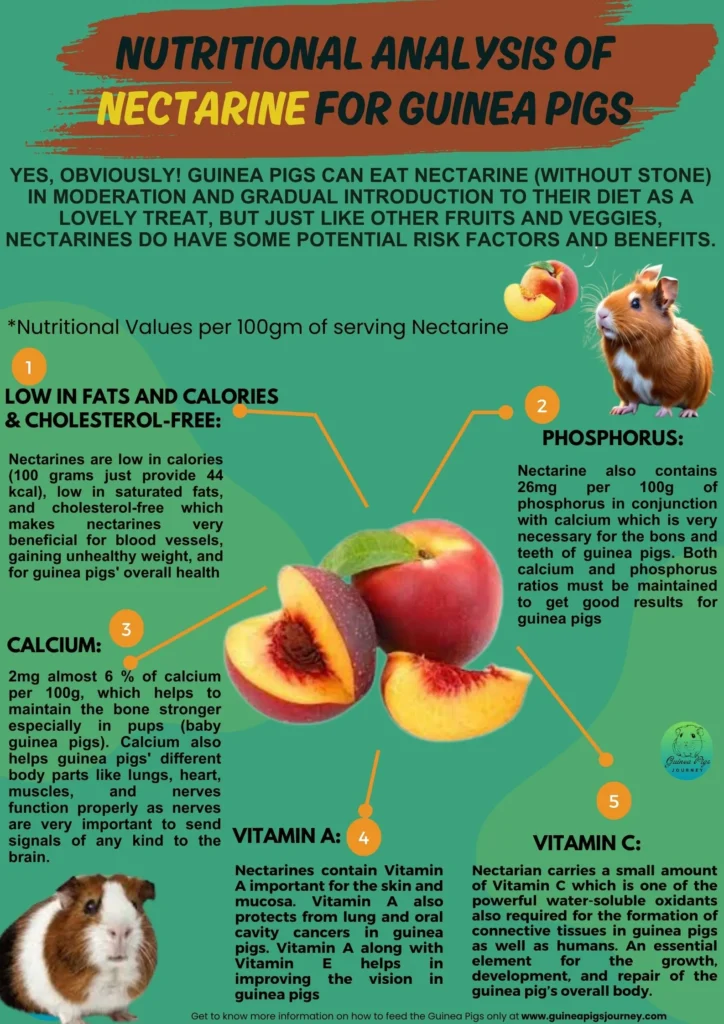
What are the Benefits of Vitamins and Nutrients Available in Nectarine for Guinea Pigs?
Nectarine is, indeed packed full of nutrients, minerals, vitamins, and antioxidants that promote the health of guinea pigs if fed in moderation. Let’s explore these benefits individually to understand the nutritional requirements and quantity of serving guinea pigs.
Vitamin C: Nectarian carries a small amount of Vitamin C which is one of the powerful water-soluble oxidants also required for the formation of connective tissues in guinea pigs as well as humans. It also helps in immune system to resist infections and recover from any illness and prevent the scurvy in Guinea pigs.
It is one of the essential elements for the growth, development, and repair of the guinea pig’s overall body. Regardless of age, sex, and health guinea pigs require a high amount of vitamin C for their nourishment and healthy lifestyle, most importantly during the elder stages of their life to build a strong immune system and resist infections and bacteria.
Low in Calories, fats, and cholesterol-free: Nectarines are low in calories (100 grams provide 44 kcal), low in saturated fats, and cholesterol-free which makes nectarines very beneficial for blood vessels, gaining unhealthy weight and for guinea pigs’ overall health.
Anti-Oxidants Vitamins: Fresh and juicy nectarines also contain healthy anti-oxidant vitamins such as Vitamin A, and E, flavonoid polyphenolic antioxidants lutein, zeaxanthin, and ß-cryptoxanthin which help to act as protective scavengers against oxygen-derived free radicals and reactive oxygen species, that means it will protect guinea pigs against the aging and various diseases processes.
Vitamin A: Nectarine contain Vitamin A important for the skin and mucosa. Vitamin A also protects from lung and oral cavity cancers in guinea pigs. Vitamin A along with Vitamin E helps in improving the vision in guinea pigs.
Minerals: Nectarine contains certain levels of minerals and electrolytes like Potassium important for the regulation of heart rate in contraction and relaxation and lowers the high blood pressure of guinea pigs, Iron required for the formation of red blood cells in guinea pigs, zinc, copper, phosphorus.
Calcium: Nectarine carries 2mg almost 6 % of calcium per 100g, which helps to maintain the bone stronger especially in pups (baby guinea pigs). Pregnant guinea pigs also require some amount of calcium to maintain their bones. Calcium also helps guinea pigs’ different body parts like lungs, heart, muscles, and nerves function properly as nerves are very important to send signals of any kind to the brain.
Phosphorus: Nectarine also contains 26mg per 100g of phosphorus in conjunction with calcium which is very necessary for the bons and teeth of guinea pigs. Both calcium and phosphorus ratios must be maintained to get good results for guinea pigs. Phosphorus also helps to regulate the carbohydrates and fats accumulated in the body parts of guinea pigs, providing them a good energy boost and activeness.
Fiber: Nectarines contain fibers that help to maintain a good digestive system in guinea pigs. Guinea pigs need fiber due to their weak digestive system. Soluble and insoluble dietary fiber helps break down the food and promote bowel movement easily.
Water: Nectarines contain 89g of water per 100g, which helps in maintaining the hydration process and saves from dehydration. Guinea pigs most the body parts need water, nectarine as a treat may also provide some water to make it healthy for guinea pigs. During summer, offering nectarines may also help dehydration away from furry friends.
Risk factors associated with Nectarines for guinea pigs:
As much as we know the potential benefits of offering Nectarian in a guinea pig’s diet, it’s crucial to address the risks associated with excessive consumption. While moderation is generally advised for any treat or addition to a guinea pigs’ menu, Nectarian poses specific concerns when consumed in large quantities.
Allergies and Sensitivities: Guinea pigs, like humans, can develop allergies or sensitivities to certain foods. Nectarine, while harmless, may trigger allergic reactions in some individuals. These reactions can be evident as skin irritations, itching, or digestive issues. It’s important to monitor your guinea pig closely when introducing Nectarine and be vigilant for any signs of an allergic response.
Potential Digestive Issues: Excessive Nectarian consumption can lead to digestive problems in guinea pigs. The high sugar content in Nectarian may disrupt the balance of bacteria in their digestive system, causing issues such as diarrhea or stomach discomfort. To avoid these problems, it’s recommended to limit the quantity of Nectarian and ensure it’s part of a well-balanced diet.
Weight Management: Guinea pigs are prone to obesity, and excessive Nectarian intake can contribute to weight-related issues. The sugars and calories in Nectarian can lead to weight gain if not consumed in moderation. As part of responsible pet ownership, it’s essential to monitor your guinea pig’s weight and adjust their diet accordingly to maintain a healthy balance.
Dental Concerns: Guinea pigs have unique dental needs, and excessive Nectarian consumption can pose challenges to their dental health. The sugars in Nectarian can contribute to dental issues such as cavities and overgrown teeth. Regular dental check-ups and a balanced diet are crucial to prevent these problems.
Kidney and bladder stone: Excessive intake of nectarine may also lead to kidney, or bladder stones due to excessive accumulation of calcium inside guinea pigs. That is very dangerous for guinea pigs’ overall health.
Do Peaches and Nectarine provide the same Nutritional values for Guinea Pigs?
Although both belong to the family of stone fruits and have the same appearance, texture, and nutrient profile, as summertime fruit for Guinea pigs, but still have some genetic and culinary differences.
Peaches (Prunus persica) can grow in diverse climates between tropical to temperate and these are fairly larger than nectarines and have fuzzy skin and soft white or yellow flesh then nectarine, whereas Nectarines (Prunus persica var. nucipersica) are a type of peach but genetically mutated, have a smooth skin rather a fuzzy skin like peaches. Otherwise, they are indistinguishable from a genetic outlook. Like all peaches, nectarines can have freestone, clingstone, or semi-freestone pits, as well as yellow or white flesh.
Nutritional Comparison of Peach and Nectarine:
It is equally important for a guinea parent to know about both fruits from the same family to make a better choice to feed their guinea pigs. The table below compares the nutrients available in 100 grams of each fruit;
| Nutrients | Peaches | Nectarines |
| Calories | 46 kcal | 43 kcal |
| Protein | 0.91 grams | 1.06 grams |
| Dietary Fiber | 1.5 grams | 1.5 grams |
| Sugar | 8.39 grams | 7.89 grams |
| Fat | 0.27 grams | 0.28 grams |
| Calcium | 4 mg | 2 mg |
| Potassium | 122 mg | 131 mg |
| Niacin | 0.806 mg | 1.12 mg |
| Vitamin A | 24 mcg | 21 mcg |
| Vitamin C (Ascorbic acid) | 4.1 mg | 2.9 mg |
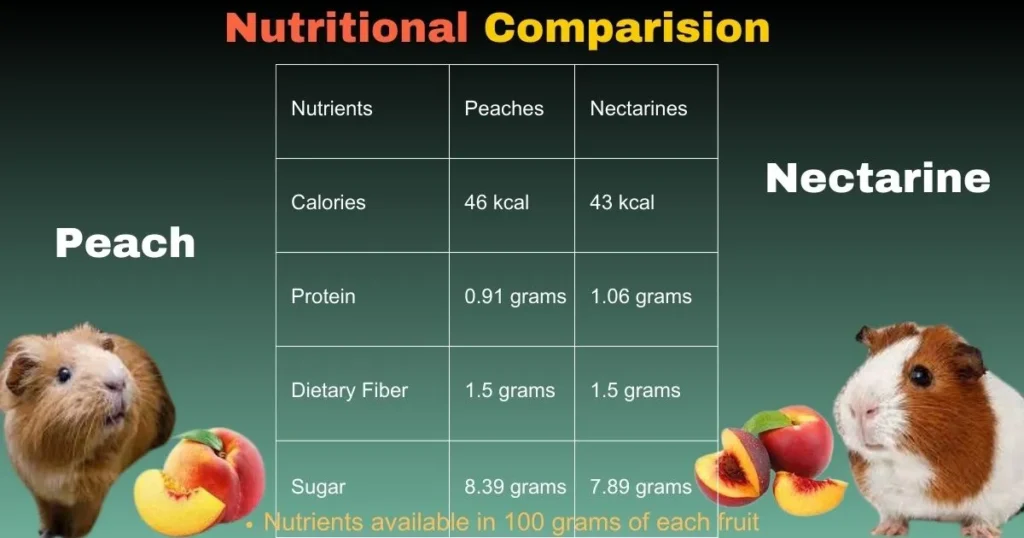
Peaches are slightly higher in calories, vitamin C, and sugar, but they still both have almost the same nutrient profile. They are both impartially high in natural sugars, contain a decent amount of fiber, and provide small amounts of micronutrients like potassium and vitamins A, C, and E, etc.
What Is the Frequency and Serving Size of Nectarines for Guinea Pigs?
Always remember, to feed every food in moderation to your guinea pigs to ensure safe and the best nutrients for their overall health. However, you must know the frequency and serving size to feed nectarine to your guinea pigs.
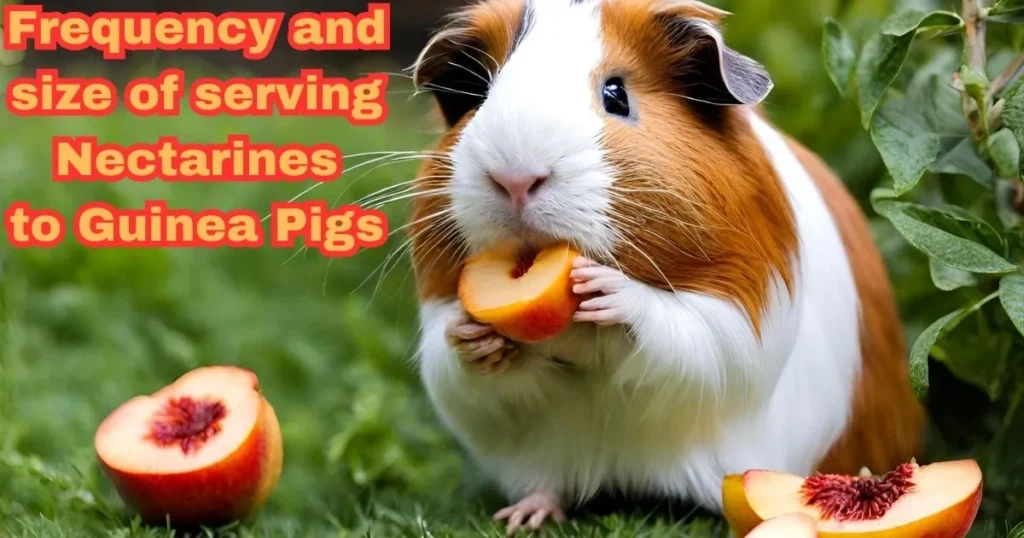
- Frequency of feeding Nectarine: While Nectarines can be a tasty addition to your guinea pig’s diet, moderation is key. It’s recommended to offer Nectarines as an occasional treat rather than a daily staple. You can offer nectarine to your guinea pigs once or twice a week to ensure the moderation process.
- Serving Size of Nectarines: First and foremost, Gradual introduction is very important to serve guinea pigs. However, it is recommended that you can serve a small, sliced, bite-size portion compared to around maybe two, and one-inch chunks to your furry friends. It is equally important to observe or monitor their behavior or any adverse reaction.
- Gradual Introduction: Guinea pigs may have changing preferences, and some may take time to familiarize themselves with new foods like Nectarines. To introduce them gradually:
- Start Small: Initiate with a tiny piece to observe their reaction.
- Monitor Closely: Watch for any signs of allergies, digestive issues, or dislike.
- Increase Gradually: If the initial introduction goes well, you can slowly increase the serving size over time with moderation.
How to prepare nectarines for guinea pigs?
Preparing nectarine is not that difficult, but still being a caring owner, you must take some good steps to prepare it as a treat for your lovely pets. Here are some of the steps you must follow while offering nectarines to guinea pig cages.
Step 1: Choose / Purchase Best Quality: Guinea pigs being picky eater, require love and treats from their owners. It is best to pick fresh, spotless, and ripe nectarines not too hard to eat by guinea. Best to choose rip ones they are juicy and soft. Avoid the greenish color of nectarines, as they may be unripe.
Step 2: Wash the Nectarine: Before cutting the nectarines, wash them in running water to clean them from chemicals, harmful bacteria, dirt, and pesticides sprayed during harvesting and stores.
Step 3: Peel Off the Nectarine skin: Although Guinea pigs can eat the skin of nectarine it may cause some digestive issues or be hard to digest by guinea pigs. It is advised that, as a treat, you may peel off the nectarine to make it enjoyable.
Step 4: Remove the stone/seed inside the nectarine: There is a stone/seed inside the nectarine, which is very dangerous to serve with guinea pigs. It is a very important step to follow, remove the stone and dispose of it far away from the guinea pig’s range.
Step 5: Slice / cut the Nectarine: It is recommended that with moderation cut or slice the nectarine into small pieces or cubes to make it easy for guinea pigs to chew and swallow. They will enjoy it.
Step 6: Serve the Nectarine: If you want to see your guinea pigs enjoying. Then you can serve them as treat like feeding with your hands or on your lap in a bowl. You may also add some other fruits low in sugar to make the best treat and nutritious food.
Step 7: Clean the Cage: It is a very important step in the end for the well-being of your guinea pigs. You must clean left-out food inside the cage to avoid any harmful bacteria from multiplying and to avoid flies inside the cage irritating your cavies.
Healthy Alternatives to Nectarines for Guinea Pigs:
In some cases, guinea pigs do not like to eat nectarine due to their changing preferences and some may take time to adopt nectarine in their diet plan. Keeping in view this type of situation, you must have some healthier alternatives to nectarine to meet the nutritional requirements of guinea pigs, moderation is the key to serving. The table below shows some alternatives to Nectarian fruit;
| Peaches | Grapefruit | Raspberries |
| Blackberries | Arugula | Pineapples |
| Papayas | cherries | Apricots |
| Mustard greens | Snap peas | Tomatoes |
| Pears | Grapes | Kiwi fruit |
| Bananas | Clementine | Blueberries |
| Cranberries | Cucumbers | Oranges |
| Pummelo, raw | Rowal, raw | Wheatgrass |
| Rhubarb, raw | Abiyuch, raw | Sapodilla, raw |
| Asparagus | Plums | Strawberries, raw |
| cilantro | Apples | Watermelon, raw |
| Mangos | Mushrooms | Pumpkin seeds |
Frequently Asked Questions (FAQs):
Q: Can Guinea pigs eat Grilled / Cooked Nectarines?
No, absolutely not! Avoid offering cooked, processed, or grilled type nectarines to guinea pigs, as it may cause digestive discomfort or other health-related risk.
Q: Can Guinea Pigs Eat Canned / Processed Nectarines?
No, do not offer any kind of canned or processed food to guinea pigs’ diet including nectarines, as these types of food may lead to health-related issues like digestive problems and diarrhea.
Q: Can Guinea Pigs Eat Dried Nectarines?
No, avoid giving dried nectarines to guinea pigs, as they contain excessive sugar additives, flavor, or syrup that may lead to harmful reactions and discomfort.
Q: Can Guinea Pigs Eat Yellow Nectarines?
Yes, of course! Guinea pigs can eat yellow nectarines while keeping moderation constant here as well. Your guinea pigs enjoy eating this juicy, sweet treat containing nutrients good for their health as well.
Q: Can Guinea Pigs Eat White Nectarines?
Yes, Guinea pigs love to eat white flesh nectarines along with skin. These nectarines also contain many micronutrients good for their health.
Q: Is Nectarian suitable for all guinea pigs?
It’s important to assess individual preferences and sensitivities. While some guinea pigs may enjoy Nectarian, others may not.
Q: Can Nectarian replace other elements of a guinea pig’s diet?
Nectarian should be considered a treat rather than a replacement. A balanced diet like high-quality Hay, Fruits, Vegetables, and some number of pallets with a variety of foods is crucial with moderation.
Q: What signs indicate that a guinea pig dislikes Nectarian?
Watch for reduced consumption, turning away from the food, or signs of digestive discomfort or stomach issues.
Q: Are there specific guinea pig breeds that should avoid Nectarian?
While there’s no strict rule, some breeds may have specific dietary sensitivities. Consult with a vet for breed-specific advice.
Q: Can Guinea Pigs Eat nectarine skin?
Yes, there is no harm, Guinea pigs can eat the Skin of Nectarine, but it is advisable to peel it off before serving them. Skin may be difficult to digest by guinea pigs.

